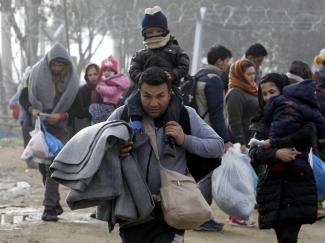European Union
Sealing Europe off is no solution

Of the 60 million, 38 million were internally displaced persons (IDPs), who, though fleeing, stayed in their country. According to the UNHCR, Syria had the largest number of IDPs in 2014: 7.6 million. Colombia came second (6 million) and Iraq third (3.6 million). The numbers are set to rise given that an end to the conflicts in Syria and other places in the Middle East and North Africa is not in sight.
The influx of refugees Europe woke up to last year did not come out of the blue. War has been raging in Syria for five years. Civilians are helplessly exposed to violence. Afghanistan and Iraq are dysfunctional states, haunted by terrorist outfits such as ISIS or the Taliban.
Lots of people have fled to neighbouring countries from Syria and Afghanistan, so Turkey, Pakistan and Lebanon now have the largest foreign-refugee populations worldwide. As things get worse in camps in Syria’s neighbouring countries, the exodus to Europe gets stronger.
It is scandalous that UN agencies have lately suffered a lack of funding and even had to cut food rations. Life in the camps is becoming unbearable, but the people concerned see no future for themselves or their children back home. Hopelessness has consequences. Some youngsters start appreciating extremists and even join terrorist groups. ISIS and the Taliban know how to recruit fighters in camps. Many more people, however, try to get to Europe, a world region that looks like a paradise of peace and prosperity.
Europe treats the refugees in a disgraceful way however. Tens of thousands of people have died in the Mediterranean Sea since the turn of the Millennium. In 2015 alone, some 3700 drowned. The EU does not offer refugees a legal option of entry.
When a large European public finally realised last year just how desperate the situation of displaced people is, Federal Chancellor Angela Merkel declared that refugees are welcome in Germany. This stance earned her international respect. Earlier, German civil society had begun to make impressive voluntary efforts to accommodate refugees in a sense of human solidarity and decency.
As the influx of refugees has not stopped, however, Merkel is now facing headwinds – even within her own party. Some demand her government should close borders and define a maximum number for refugees who may come to Germany. For good reason, Merkel argues that such measures would violate human rights.
All European governments must now assume responsibly. They tend to tell their counterparts from developing countries that human rights must be respected. Obviously, the EU must respect them too. If its members shy from doing so only because the requirements are demanding, their credibility in Africa, Asia and Latin America will be further eroded. Such a stance, moreover, would do nothing to motivate the Muslim allies Europe needs in the fight against terrorist forces.
Sabine Balk is a member of D+C/E+Z's editorial team.
euz.editor@fs-medien.de












